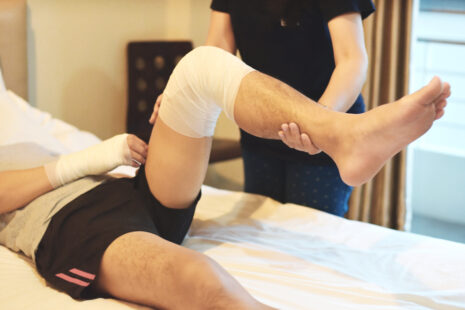It’s important to consult with a medical professional for an accurate diagnosis and appropriate treatment plan.
Medial Collateral Ligament (MCL) Injury…
- Location of Pain – Pain on the inner side (medial aspect) of the knee joint.
- Mechanism of Injury – MCL injuries often occur due to a direct blow to the outer side of the knee or a force that pushes the knee inward (valgus stress), such as during a tackle in sports or a sudden twisting movement.
- Symptoms –
- Swelling and tenderness along the inner side of the knee.
- Pain, especially with activities that involve bending or twisting the knee.
- Instability or feeling of “giving way” in the knee, particularly when weight-bearing or changing directions.
- Difficulty straightening or fully extending the knee.
- Bruising may develop along the inner side of the knee over time.
Meniscus Injury…
- Location of Pain – Pain may be felt along the joint line (where the thigh bone and shin bone meet) on the inner or outer side of the knee.
- Mechanism of Injury – Meniscus injuries can occur due to twisting or rotating the knee while bearing weight, such as during pivoting, cutting, or landing from a jump.
- Symptoms –
- Swelling and stiffness in the knee joint, particularly in the first 24-48 hours following the injury.
- Pain along the joint line, which may worsen with activities that involve bending or twisting the knee.
- Catching, locking, or clicking sensations in the knee joint, especially during movement.
- Difficulty fully bending or straightening the knee.
- Instability or sensation of the knee “giving way” in severe cases.
It’s important to note that these are general guidelines, and individual experiences may vary. Some symptoms, such as pain and swelling, can overlap between MCL and meniscus injuries. A healthcare professional, such as a physician or orthopedic specialist, can perform a physical examination, order diagnostic tests (such as X-rays or MRI), and provide a proper diagnosis and treatment plan based on your specific symptoms and circumstances.




